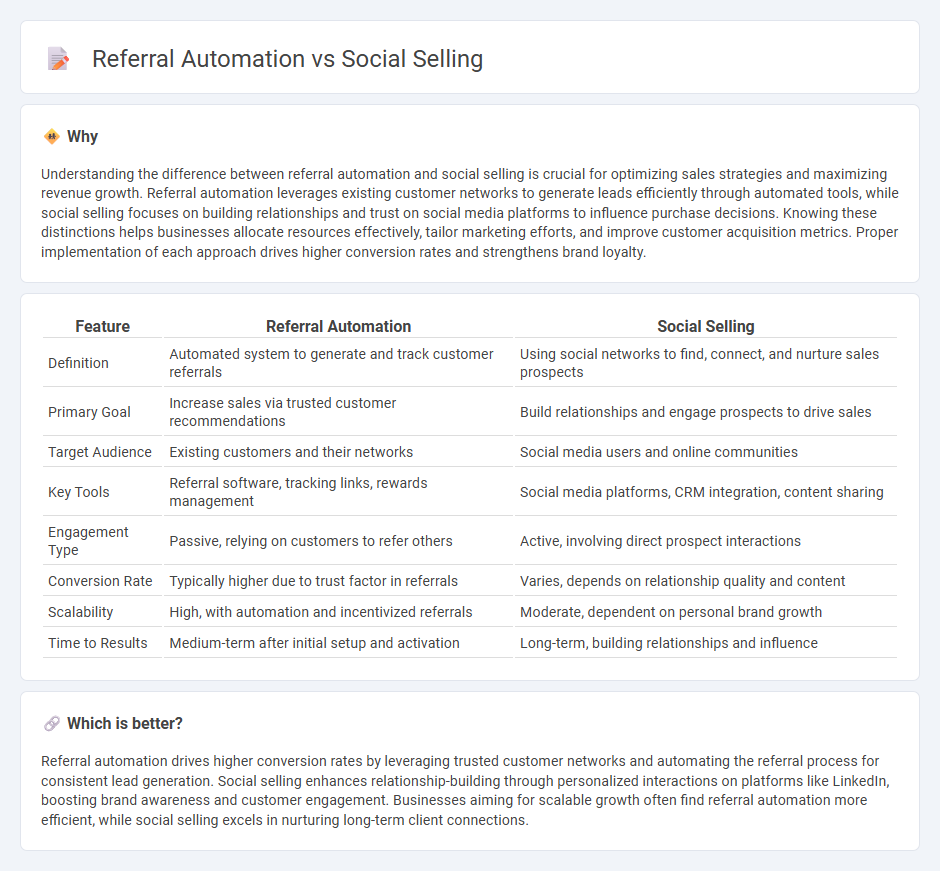
Referral automation leverages technology to streamline the process of generating high-quality leads by encouraging satisfied customers to recommend products or services. Social selling utilizes social media platforms to build relationships and engage prospects directly, enhancing trust and accelerating the sales cycle. Explore how these powerful sales strategies can boost revenue and customer loyalty.
Why it is important
Understanding the difference between referral automation and social selling is crucial for optimizing sales strategies and maximizing revenue growth. Referral automation leverages existing customer networks to generate leads efficiently through automated tools, while social selling focuses on building relationships and trust on social media platforms to influence purchase decisions. Knowing these distinctions helps businesses allocate resources effectively, tailor marketing efforts, and improve customer acquisition metrics. Proper implementation of each approach drives higher conversion rates and strengthens brand loyalty.
Comparison Table
| Feature | Referral Automation | Social Selling |
|---|---|---|
| Definition | Automated system to generate and track customer referrals | Using social networks to find, connect, and nurture sales prospects |
| Primary Goal | Increase sales via trusted customer recommendations | Build relationships and engage prospects to drive sales |
| Target Audience | Existing customers and their networks | Social media users and online communities |
| Key Tools | Referral software, tracking links, rewards management | Social media platforms, CRM integration, content sharing |
| Engagement Type | Passive, relying on customers to refer others | Active, involving direct prospect interactions |
| Conversion Rate | Typically higher due to trust factor in referrals | Varies, depends on relationship quality and content |
| Scalability | High, with automation and incentivized referrals | Moderate, dependent on personal brand growth |
| Time to Results | Medium-term after initial setup and activation | Long-term, building relationships and influence |
Which is better?
Referral automation drives higher conversion rates by leveraging trusted customer networks and automating the referral process for consistent lead generation. Social selling enhances relationship-building through personalized interactions on platforms like LinkedIn, boosting brand awareness and customer engagement. Businesses aiming for scalable growth often find referral automation more efficient, while social selling excels in nurturing long-term client connections.
Connection
Referral automation leverages technology to streamline the process of identifying and rewarding customers who recommend products or services, enhancing sales growth with minimal manual effort. Social selling utilizes social media platforms to build relationships and engage prospects, creating a fertile environment for automated referrals to thrive. Integrating referral automation with social selling amplifies lead generation, accelerates customer acquisition, and maximizes revenue potential by converting social interactions into trusted endorsements.
Key Terms
**Social Selling:**
Social selling leverages social media platforms to build relationships and engage prospects by sharing relevant content, participating in conversations, and demonstrating expertise, thereby driving trust and sales opportunities. This approach integrates with CRM tools and uses data analytics to identify and target high-potential leads efficiently. Explore how social selling strategies can transform your sales pipeline and enhance customer engagement.
Personal Branding
Social selling leverages personal branding by using social media platforms to build authentic relationships and engage prospective clients through valuable content and interactions. Referral automation optimizes the process of gathering and managing endorsements, streamlining how satisfied customers recommend your brand to others. Discover how integrating personal branding with these strategies can amplify your business growth effectively.
Engagement
Social selling leverages personalized interactions and authentic communication on social media platforms to build trust and drive customer engagement. Referral automation streamlines the process of incentivizing and managing customer recommendations, increasing the volume and quality of leads with minimal manual effort. Explore how integrating both strategies can maximize your engagement and conversion rates.
Source and External Links
Social selling - Wikipedia - Social selling is the process of developing relationships as part of the sales process, typically through social networks like LinkedIn, Twitter, and Facebook, by sharing relevant content, interacting directly with potential buyers, and building personal brands.
What Is Social Selling? (With Benefits and Best Practices) - Indeed - Social selling uses professional social media profiles to secure leads and build relationships with potential clients, helping organizations achieve sales goals through strategic interactions and content sharing on various platforms.
The Benefits of Social Selling: [The Complete Guide] - EveryoneSocial - Social selling leverages social networks to attract prospects and build trust-based relationships by answering questions, sharing meaningful content, and actively participating in conversations with potential buyers.
 dowidth.com
dowidth.com